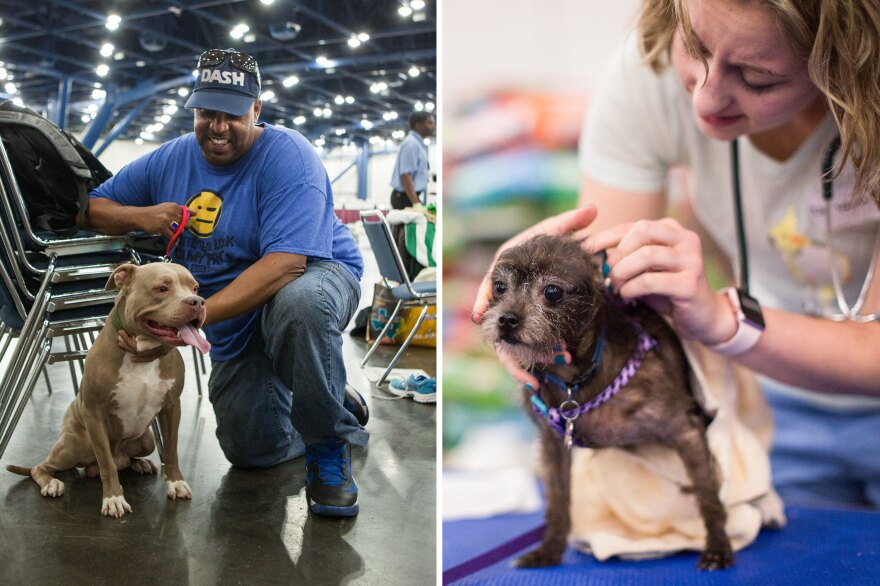After thousands of people were forced to leave their homes as a result of the flooding in Houston over the weekend, many have one thing on their minds: their pets.
As the water began to rise, Thomas Hayes, 73, stayed in his house in the neighborhood of Tidwell with his five dogs. He measured the water's climb by the height it hit on his car — first covering the tires, then the bumper, and it continued to rise. He didn't want to leave his home without his dogs.
"I wouldn't do it," he says. "I wouldn't leave without them."
When rescuers came to pick him up, he asked them to promise that he could keep his dogs. He loaded up his four small dogs, Shih Tzu mixes, in a metal trash can on top of a pile of dog food, so that he could float them on top of the water. His German shepherd mix had to swim.
Age slows Hayes' mobility, making it difficult for him to move, much less carry his dogs through thigh-deep water. He held onto all of the dogs on the long, uncomfortable ride in the back of a dump truck to the George R. Brown Convention Center, where they took him to temporary shelter.

When the convention center first opened its doors, pets weren't allowed. Some people sat outside during the deluge with their pets, unable to go home but unable to enter. Others tied their animals to street signs and lampposts so they could get some respite from the storm.
Late Sunday evening, the Bureau of Animal Regulation called Salise Shuttlesworth, the executive director of Friends For Life, a Houston no-kill shelter. By 11 p.m., she had gotten the Red Cross to let them turn one part of the convention center into a shelter for people and their pets.
"People are alive now because they can bring their animals," Shuttlesworth says.

Hayes was able to bring his dogs into Hall C, the section of the convention center that now allows pets. The volunteers there helped clean them up and dry them out. Now the dogs rest in a row of crates covered with blankets, and have plenty of food. In a corner, Hayes is set up with a cot and blankets, and sits in a chair sipping a steaming cup of coffee.
People have pulled their cots together to create their own spaces in the vast room. Some snuggle with their dogs under blankets, while others walk them on leashes throughout the space. A dog grooming business, Your Hipster Pet, sets up a bathing station where pet owners can wash the remnants of dirty water off the animals. There are dogs, from tiny toy breeds to pit bulls, numerous cats, ferrets, and even a bird.

Shuttlesworth says they've distributed more than 10,000 pounds of pet food. During the first few days, volunteer veterinarians and vet techs from Houston clinics were treating injuries, giving out warm towels to the soaking wet animals, and cleaning and disinfecting them from the dirty water. They're also giving vaccines, and heartworm and flea and tick medications. They have over 6,000 donated doses of vaccines that come from local clinics as well as manufacturers like Patterson and Merck.

The volunteers are also happy to just take dogs for walks, or keep an eye on them while their owners take care of other needs. As Chicquita and Gary Singletary pass their friendly pit bull, Blue, to the volunteers, Blue greets them with excitement and energy. Volunteers take Blue for a walk while the Singletarys go to fill out their FEMA applications at one of the assistance tables outside of the pet area.
"What is going on with Blue is that he is homeless, just like we are," Gary says.
Meanwhile, Salise Shuttlesworth is already looking towards the next steps for the pets of Houston. She's considering how some of the donated resources can be distributed to shelters in need, and expects that the local shelters that aren't flooded are going to start filling up with homeless pets. As people return — or don't — to damaged homes, they're going to have to continue to figure out how to hold onto their pets.
"I don't know what I'm going to do when I get out. I just don't know," Thomas Hayes says. "I don't have anyone to pick me up, and my car was flooded. How will I take them?"
Copyright 2023 NPR. To see more, visit https://www.npr.org.



